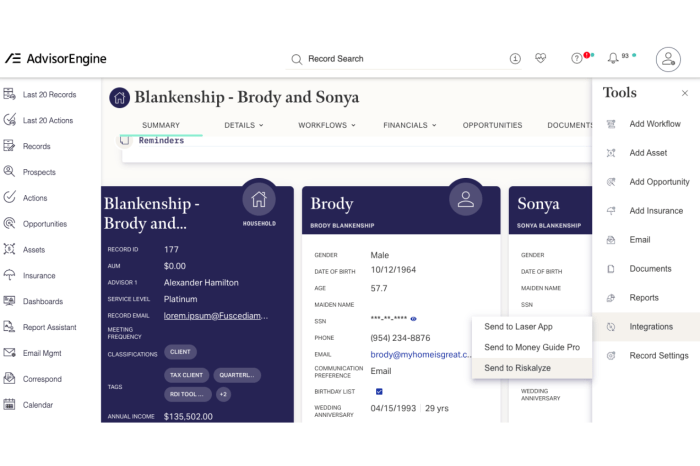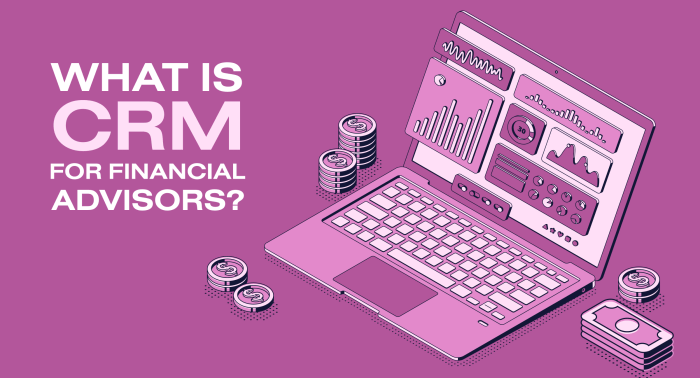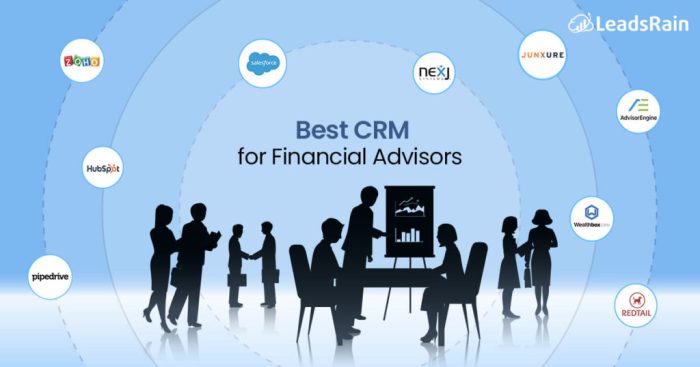In today’s competitive financial landscape, managing client relationships effectively is paramount for success. Financial advisor CRM software offers a powerful solution, streamlining operations and enhancing client engagement. This comprehensive guide delves into the intricacies of these systems, exploring their features, benefits, and considerations for selection. We’ll cover everything from essential functionalities to advanced capabilities, helping you make an informed decision for your practice.
Understanding Financial Advisor CRM Software
Financial advisor CRM software, or Customer Relationship Management software, is specifically designed to meet the unique needs of financial professionals. Unlike generic CRM systems, these platforms incorporate features tailored to managing client portfolios, tracking investments, scheduling appointments, generating reports, and fostering strong client relationships. They act as a central hub for all client-related information, providing a 360-degree view of each individual’s financial situation.
Key Features of a Robust Financial Advisor CRM
- Client Management: Centralized storage of client data including contact information, financial goals, risk tolerance, and investment preferences.
- Portfolio Management: Tracking client portfolios, analyzing performance, and generating reports on asset allocation.
- Communication Tools: Secure messaging, email integration, and potentially video conferencing capabilities for seamless client interaction.
- Document Management: Secure storage and easy access to crucial client documents like proposals, agreements, and statements.
- Appointment Scheduling: Streamlined scheduling with calendar integration and automated reminders.
- Reporting and Analytics: Generating customized reports on client performance, revenue, and other key metrics for business insights.
- Compliance Features: Tools to help maintain regulatory compliance, such as audit trails and data security measures.
- Integration Capabilities: Seamless integration with other financial tools and platforms, such as accounting software and investment platforms.
- Workflow Automation: Automating repetitive tasks like email marketing and client onboarding.
- Client Portal: A secure online portal for clients to access their information, documents, and communicate with their advisor.
Benefits of Using Financial Advisor CRM Software
Implementing a financial advisor CRM offers a multitude of benefits, ultimately contributing to increased efficiency, improved client relationships, and enhanced business growth.
Improved Client Relationships
By centralizing client information and communication, CRM software allows advisors to provide personalized service and maintain consistent contact. This fosters stronger relationships, leading to increased client retention and referrals.
Increased Efficiency and Productivity
Automating tasks like scheduling, reporting, and communication frees up valuable time, allowing advisors to focus on high-value activities such as financial planning and client consultations. This leads to increased productivity and potentially higher revenue.

Source: revopsteam.com
Enhanced Compliance and Risk Management
Built-in compliance features help advisors adhere to regulatory requirements, reducing the risk of errors and penalties. Secure data storage and audit trails ensure data integrity and protection.
Better Business Insights
Comprehensive reporting and analytics provide valuable insights into client behavior, portfolio performance, and business trends. This data-driven approach allows for strategic decision-making and business optimization.
Choosing the Right Financial Advisor CRM Software
Selecting the right CRM software is crucial for maximizing its benefits. Consider the following factors:
Scalability and Customization
Choose a system that can adapt to your growing business needs. Look for customizable features and scalable solutions to accommodate future growth.
Integration Capabilities
Ensure the CRM integrates seamlessly with your existing financial tools and platforms to avoid data silos and streamline workflows.
User-Friendliness and Training, Financial advisor crm software
Opt for a user-friendly interface that is easy to learn and navigate. Consider the availability of training resources and support.
Cost and Pricing Models
Evaluate the different pricing models (subscription, one-time purchase, etc.) and ensure the cost aligns with your budget and anticipated ROI.
Security and Data Protection
Prioritize a system with robust security measures to protect sensitive client data. Look for encryption, access controls, and compliance certifications.
Top Financial Advisor CRM Software Options
(Note: This section would typically list and briefly describe several popular CRM platforms. Due to the ever-changing nature of software and potential conflicts of interest, specific product recommendations are omitted. Researching current market leaders is recommended.)
Frequently Asked Questions (FAQs)
- Q: What is the average cost of financial advisor CRM software? A: The cost varies greatly depending on the features, number of users, and provider. Expect a range from affordable monthly subscriptions to more expensive enterprise-level solutions.
- Q: How long does it take to implement a financial advisor CRM? A: Implementation time varies depending on the complexity of the system and the size of your firm. It can range from a few weeks to several months.
- Q: What are the key performance indicators (KPIs) to track with a financial advisor CRM? A: Key KPIs include client acquisition cost, client retention rate, average revenue per client, and overall portfolio performance.
- Q: Can I integrate my existing financial software with a CRM? A: Many CRMs offer integration capabilities with popular financial platforms. Check for compatibility before selecting a system.
- Q: What security measures should I look for in a financial advisor CRM? A: Look for encryption, access controls, regular security updates, and compliance with relevant data protection regulations (e.g., GDPR, CCPA).
Conclusion
Financial advisor CRM software is no longer a luxury but a necessity for financial professionals seeking to optimize their operations, enhance client relationships, and drive business growth. By carefully considering the factors Artikeld above and selecting a system that aligns with your specific needs, you can leverage the power of technology to elevate your practice and achieve lasting success.

Source: soloway.tech
References
(This section would include links to reputable sources such as industry publications, software review sites, and regulatory bodies. Again, specific links are omitted to avoid bias and maintain objectivity.)
Call to Action
Ready to transform your financial advisory practice? Explore the leading CRM solutions available and request a demo today to experience the benefits firsthand!
Questions and Answers
What are the key features of a good financial advisor CRM?

Source: leadsrain.com
Key features include client relationship management, contact management, task automation, document storage, reporting and analytics, and integration with other financial software.
How much does financial advisor CRM software cost?
Pricing varies greatly depending on the features, vendor, and number of users. Expect to find options ranging from affordable monthly subscriptions to more comprehensive, enterprise-level solutions.
Is CRM software difficult to learn and use?
Most modern CRM systems are designed with user-friendliness in mind. Many offer intuitive interfaces and comprehensive training resources to help advisors get up and running quickly.
How can I choose the right CRM for my practice?
Consider your specific needs and budget, research different vendors, and read reviews before making a decision. Try out free trials or demos whenever possible.
